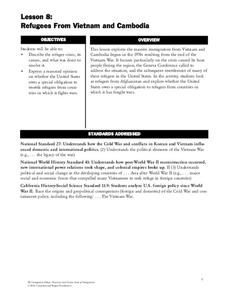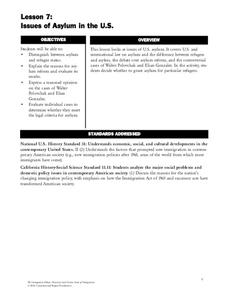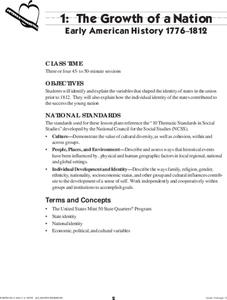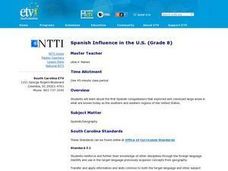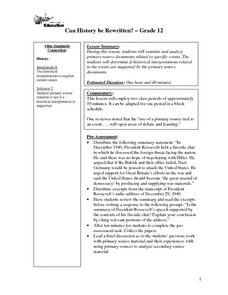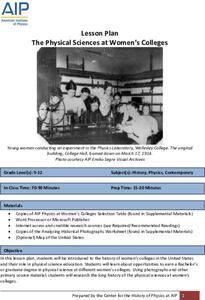Curated OER
Let Me Tell You About My State
State reports can be a lot of fun, especially when the learners get to choose the state they study. This research and writing-focused social studies instructional activity engages learners in collecting information, essay structure,...
Curated OER
California's Golden History: 1848-1880
Using a variety of online resources, learners study life and society in California during the gold rush. They use a map to identify area where gold was located, explore pre-selected websites, describe mining practices, and create an...
NPR
The History of America’s Weed Laws
To understand the laws regarding marijuana use in the United States, you can go all the way back to the 1800's to learn about farming hemp, or you can go back to 2018 when California became the sixth state to legalize recreational...
Theodore Roosevelt Association
Defining America's Role in the World
As the first American president to win the Nobel Peace Prize, and only one of four presidents to do so in United States history, Theodore Roosevelt's foreign policy achievements and preservation of peace are often overshadowed by his...
Constitutional Rights Foundation
Refugees From Vietnam and Cambodia
The United States may have pulled its troops from the Vietnam War in 1973, but the conflict was far from over for the citizens living in Asia at the time. An informative resource lets learners know about the wave of over 220,000...
Constitutional Rights Foundation
Issues of Asylum in the U.S.
Who gets to come to the United States? Examine cases of individuals seeking asylum with an informative reading passage that includes examples, statistics, and representations of public opinion regarding asylum. Groups then go on to...
Alabama Department of Archives and History
Clotilde, The Last Slave Ship
The Clotilde was the last known ship to bring slaves from Africa to the United States - good riddance! Dive into the details of the ship, its cargo, origin, and route, and learn about the future of the Africans on board with a...
PBS
Evolution of the Presidency: Theodore Roosevelt to Franklin D. Roosevelt
How much power should a president be allowed to exert? Theodore Roosevelt and Franklin D. Roosevelt exercised their power according to their interpretations of the United States Constitution, and these interpretations affected the...
West Virginia Department of Education
Intelligence of Authentic Character - News Coverage and John Brown's Raid
The resource, a standalone, shows how news coverage of John Brown's Raid began when the event happened and how that reporting shaped perception in West Virginia history. The resource includes interesting anticipatory discussion...
US Mint
The Growth of a Nation
Young historians explore the identity of the early United States in this four-part lesson series. Working in groups of three, students research the political, economic, and cultural atmosphere of each member of the union prior to 1812,...
Smithsonian Institution
Art to Zoo: Life in the Promised Land: African-American Migrants in Northern Cities, 1916-1940
This is a fantastic resource designed for learners to envision what it was like for the three million African-Americans who migrated to urban industrial centers of the northern United States between 1910 and 1940. After reading a...
West Virginia Department of Education
Declarations and the Quest for Life, Liberty and the Pursuit of Happiness
Understanding how John Brown got his inspiration from the Declaration of Independence helps learners further understand both West Virginia and United States history. The resource, a standalone, uses worksheets, discussion, and essay...
Center for History Education
To What Extent Were Women's Contributions to World War II Industries Valued?
Women rose to the challenge when the nation's war effort called them—but were sent home when the GIs came back from World War II. Young historians consider whether the United States valued women's contributions during the war using a...
Digital Public Library of America
Teaching Guide: Exploring To Kill a Mockingbird
Harper Lee's To Kill a Mockingbird, considered by many to be a seminal piece of American literature, contains many complex literary themes that carry through United States history. Use a series of discussion questions and classroom...
Curated OER
America's Wars, 1898-1945
Students examine the wars the United States was involved in between 1898 and 1945. In groups, they determine the causes and effects of each war and how each war changed the way the United States handled their foreign affairs. As a class,...
Heritage Foundation
Voting and the Constitution
How difficult was it for everyone to get voting rights? Understanding voting rights and the fight to get them for everyone in the United States can be tricky for some learners. However, they are clarified after engaging in the...
Curated OER
Intermediate Level Lesson Plan THEMATIC ESSAY
Students identify three reasons why conflict arose in the Western United States during the late 1800s. Using specific examples, discuss how the United States government attempted to resolve these conflicts. Evaluate whether these...
Curated OER
Looking at Human Struggle Through The Language Arts Curriculum: The Faces of Slavery
Sixth graders examine the use of slavery in the United States. Using a map, they draw the route of the Tecora and Amistad voyages. Individually, they write an essay describing their opinions on whether the Africans on the ships should be...
Curated OER
Spanish Influence in the U.S.
Eighth graders research the role of the first Spanish conquistadors who explored the now United States. Using the internet, they gather information on different explorers and write a paper about why he is important in American history. ...
Alabama Department of Archives and History
Conflict in Alabama in the 1830s: Native Americans, Settlers, and Government
To better understand the Indian Removal Act of 1830, class members examine primary source documents including letters written by Alabama governors and the Cherokee chiefs. The lesson is part of a unit on the expansion of the United...
Curated OER
Can History Be Rewritten?
Can history be rewritten? Or, more precisely, is history documented accurately? High school juniors and seniors compare primary source material with secondary sources. For example, they compare President Roosevelt's December 29, 1940...
National WWII Museum
Rationing by the Numbers: Quantitative Data as Evidence
What was it like to live on wartime rations in the United States during World War II? Young historians find out by exploring how those on the home front bought food thanks to the ration system. Other data includes statistics on car sales...
American Institute of Physics
The Physical Sciences at Women's Colleges
After a brief introduction to the history of women's colleges in the United States and a discussion of the resistance such institutions faced, young scientists investigate seven traditionally women's colleges and their physics programs....
Curated OER
Book: Crossing the Seas
As learners read each chapter of Eric Schwartz's Crossing the Seas, they analyze the actions of United States in Venezuela, Hawaii, Cuba, the Philippines, Puerto Rico, and the intent of the Monroe Doctrine. They then compare American...






